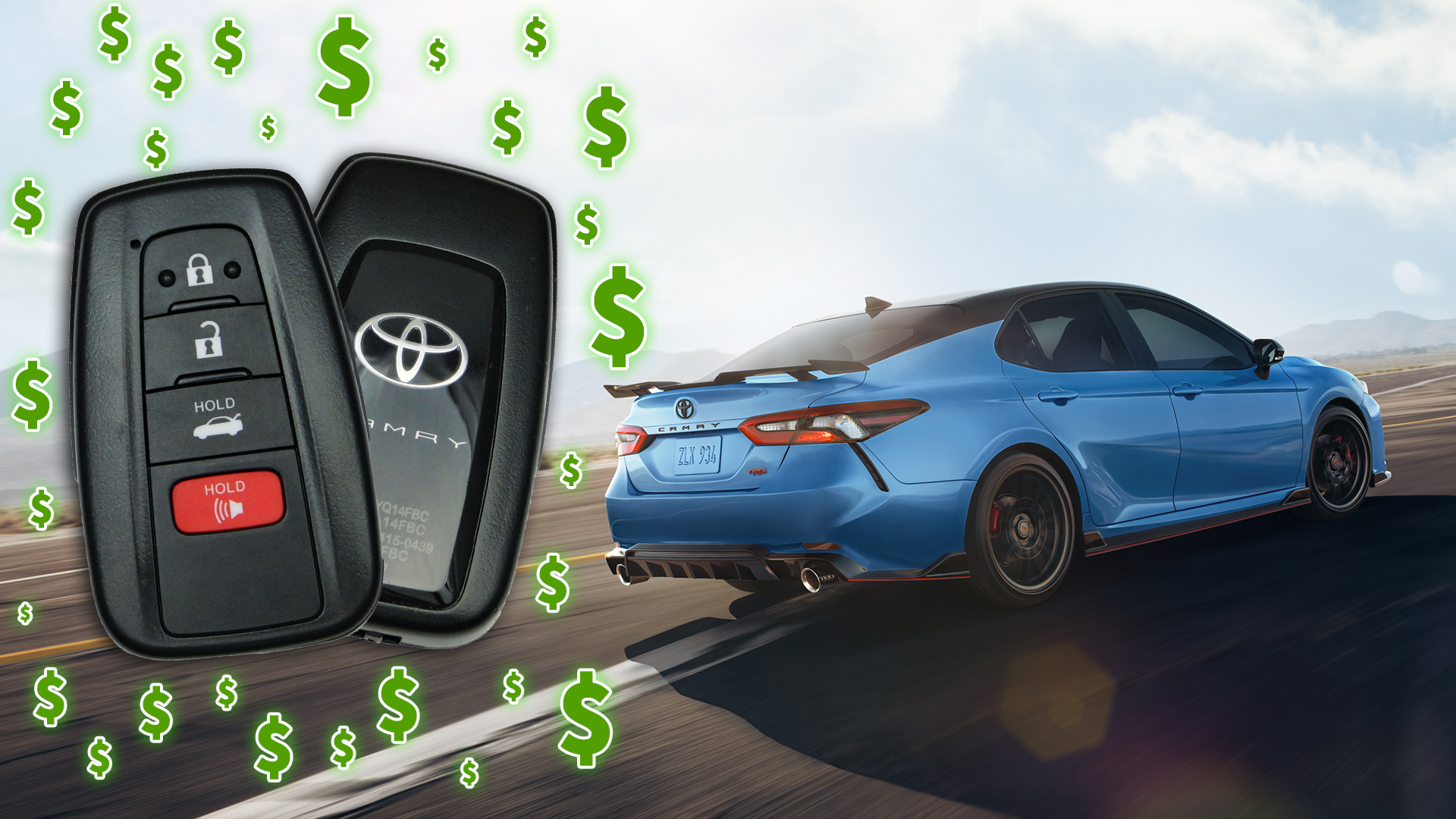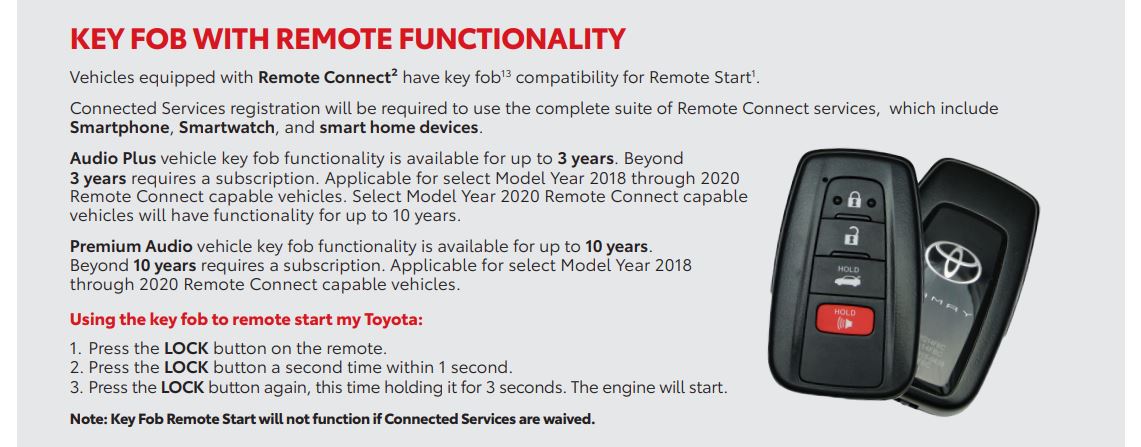

Remember when BMW wanted to charge drivers to use Apple CarPlay? How about the subscription required for the Mercedes EQS’s rear-wheel steering functionality in Europe? It turns out that luxury marques aren’t the only ones looking to cash in on that sweet, sweet software as a service cash: Toyota has been testing the waters by making the remote start functionality on your proximity key fob part of a larger connected services subscription.
Yes, it appears the pay-to-play ethos that’s spreading around the industry has reached the world’s largest automaker. A Toyota spokesperson confirmed to The Drive that if a 2018 or later Toyota is equipped with Toyota’s Remote Connect functions, the vehicle must be enrolled in a valid subscription in order for the key fob to start the car remotely. To be clear, what we’re talking about is the proximity-based RF remote start system, where you press a button on the fob to start the car while outside of it within a certain distance—say, from your front door to warm up your vehicle in the driveway on a cold morning before you get in. Your fob uses radio waves to communicate with the car, and no connection back to Toyota’s servers is needed. But the function will not work without a larger Remote Connect subscription.
It’s become more common in recent years for automakers to charge for apps that allow drivers to monitor, lock, or start their cars with their smartphones. As far as we can tell, though, Toyota’s the first company to charge for full use of your physical key fob—either $8 a month or $80 a year at the Remote Connect plan’s current price.

When buying a new Toyota, buyers have the option to trial Toyota’s Connected Services. These can include features like emergency assistance, hotspot connectivity, and app-based services like remote vehicle unlocking and starting. The length of Toyota’s trial depends on the vehicle in question, as well the audio package included in the vehicle. For example, vehicles equipped with Audio Plus get a trial of up to three years whereas Premium Audio may have a trial for up to 10 years. Beyond that, drivers will need to pay for a subscription to continue using the key fob’s remote start.
It also might not be obvious when buying a new Toyota that the remote start function is tied to a subscription. For example, the dealer video below shows a brief overview from a salesperson who states that the key should work on certain Toyotas “as long as [they have] Audio Plus”—no mention of the trial period or required subscription once that ends.

News of Toyota’s decision surfaced on Reddit last month after an eagle-eyed user spotted some wording in Toyota’s Remote Connect marketing materials that suggested an ongoing subscription would be required for drivers to start their car remotely with their key fob. The phrasing was confusing, and some wondered whether Toyota would actually take this step. A peek at various Toyota forums shows some owners have been reckoning with this possibility for a couple years now, though with many 2018 or newer Toyotas still within their subscription trial periods, it’s entirely possible that most drivers are unaware of the arrangement.
Though the thread on Reddit was eventually labeled “Potentially Misleading” by moderators after garnering hundreds of comments, Toyota’s response to The Drive was unequivocal: A paid subscription is required for the key fob’s remote start function to work for every single model.
Ten years might seem like a long time. According to a study by iSeeCars, the average vehicle owner keeps their car for around 8.4 years. Toyota is ranked as the longest-kept manufacturer, with the average vehicle ownership lasting nine years. Cars are also lasting longer than ever with the average age of vehicles on the road being 12.1 years old, meaning that people are keeping new and used rides longer than ever. It’s plausible that a vehicle will change hands during that 10-year trial period, leading to the remote start function deactivating after someone purchases the vehicle used. But it’s just as plausible that the original owner will have to pay up.
What’s even more unknown is how technology might affect something like this in the future. For example, cellular providers in the U.S. have earmarked the end of the 3G cellular network, a technology that many vehicles rely on today in order to call home to the mothership, so to speak. We’ve got a whole explainer on that available here, but the long and the short of it is that the situation is particularly dire for Toyota owners.
While some other manufacturers are retrofitting vehicles to be compatible with newer LTE networks, Toyota is discontinuing Connected Services support for the affected vehicles, all of which are model year 2019 or earlier. A Toyota spokesperson confirmed to The Drive that it has no plans to offer an upgrade, paid or otherwise, to vehicles affected by the 3G shutdown. Perhaps not coincidentally, the automaker also announced that it has “enhanced” vehicles built before Nov. 12, 2018, to no longer require a subscription for the key fob’s remote start feature to function.

It’s pretty clear that consumers aren’t exactly rooting for subscription services in the auto industry. Toyota’s example feels a bit egregious; it would be different if the key required a separate cellular connection or paired with the owner’s phone via bluetooth and utilized the app’s baked-in connectivity. But this is a physical key fob that needs to communicate directly with the vehicle via radio frequency—no remote connection back to Toyota is needed. So why require a subscription?
Update 12/11/2021 @ 2:20 pm ET: The story has been updated to clarify that the key fob’s proximity-based radio frequency remote start function will not work without a paid subscription to Toyota’s Remote Connect suite of connected services. The Drive regrets any confusion the original copy may have caused.
Got a tip or question for the author? Contact them directly: rob@thedrive.com